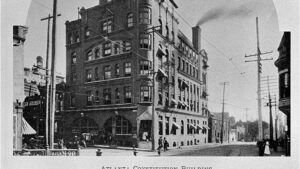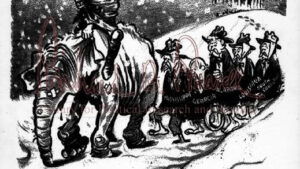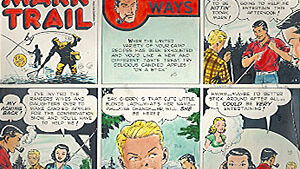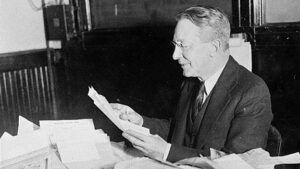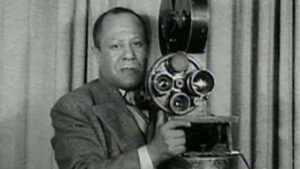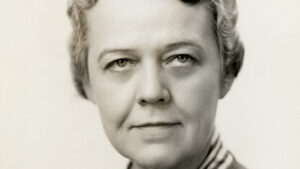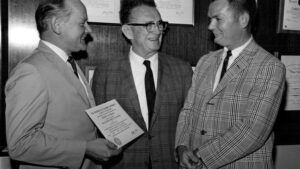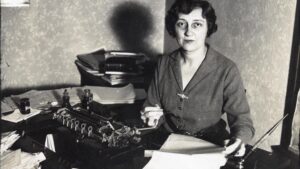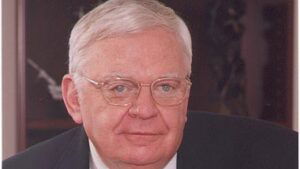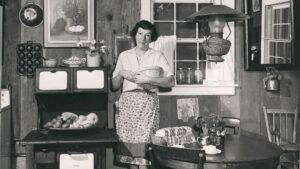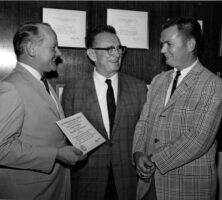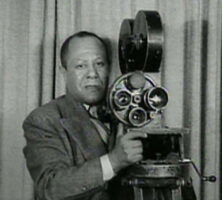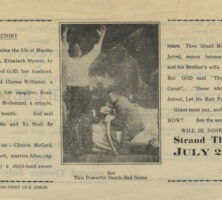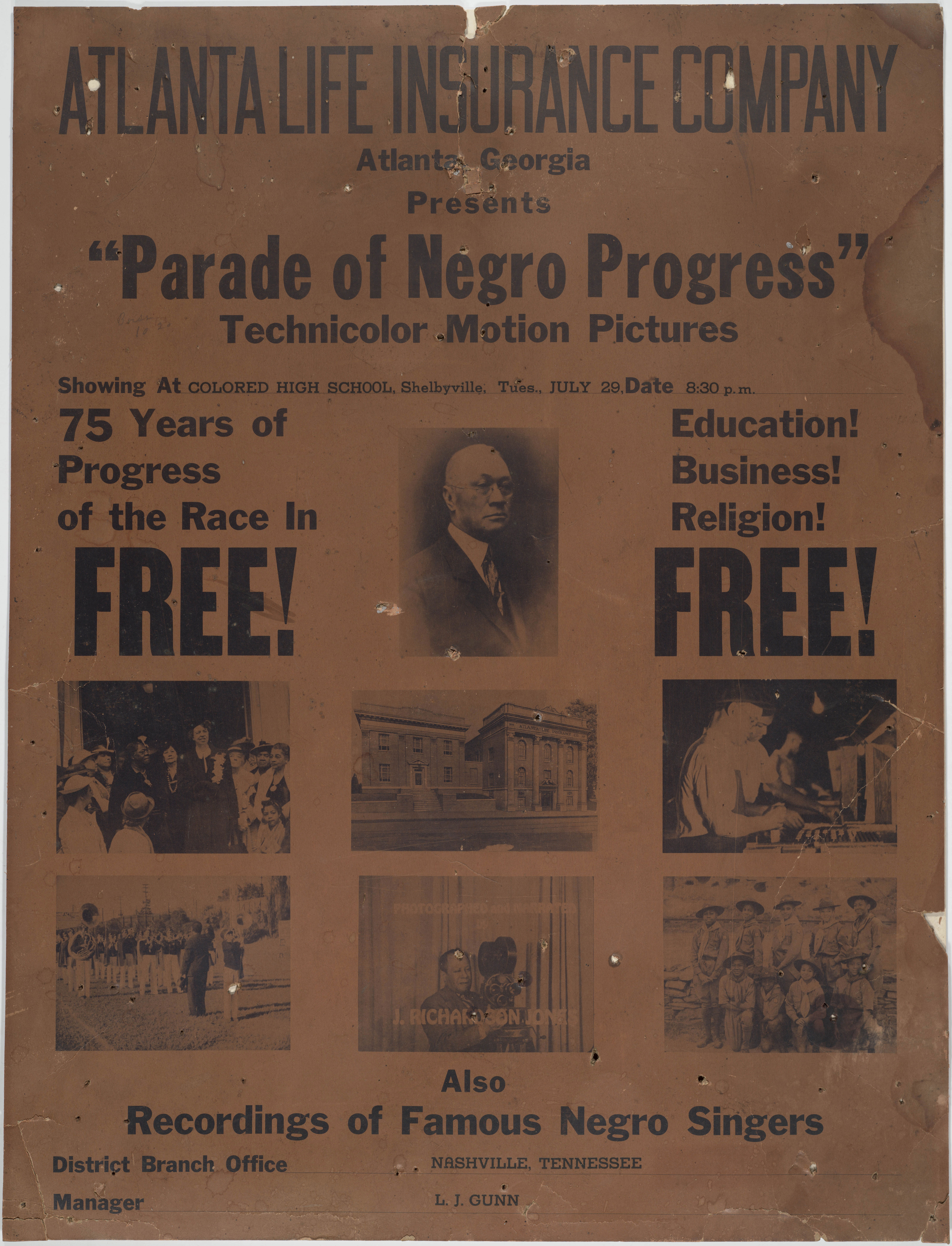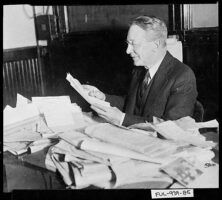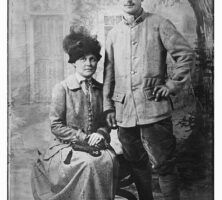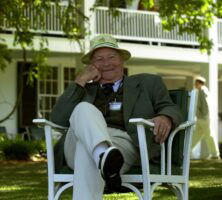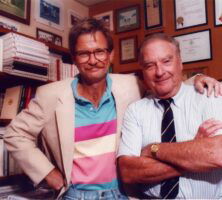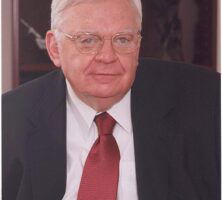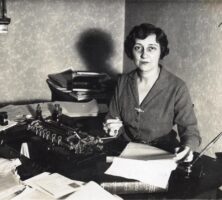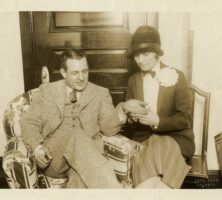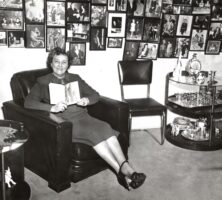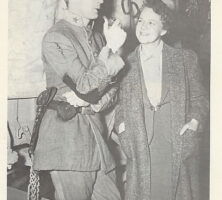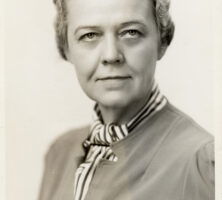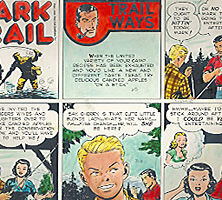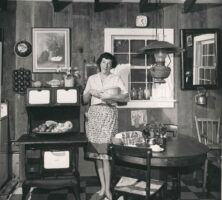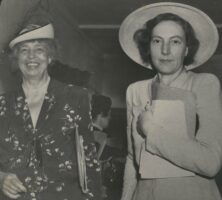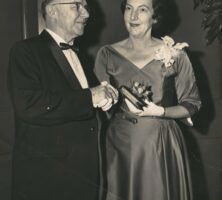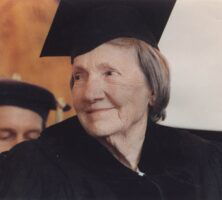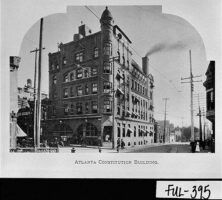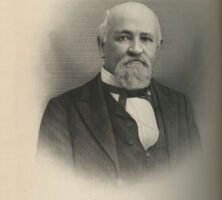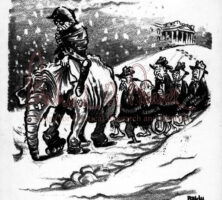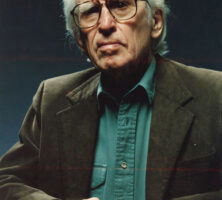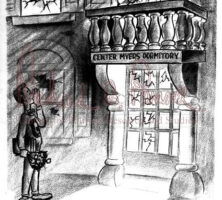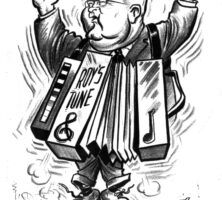The New Georgia Encyclopedia is supported by funding from A More Perfect Union, a special initiative of the National Endowment for the Humanities.
Atlanta Constitution journalists and Pulitzer Prize winners Gene Patterson (left), Ralph McGill (center), and Jack Nelson are pictured circa 1967, the year Patterson received the award.
Courtesy of Atlanta Journal-Constitution.
The New Georgia Encyclopedia does not hold the copyright for this media resource and can neither grant nor deny permission to republish or reproduce the image online or in print. All requests for permission to publish or reproduce the resource must be submitted to the Atlanta Journal-Constitution.
Gene Patterson, pictured in 2002, was an influential editor of the Atlanta Constitution during the civil rights movement and later founded Georgia Trend magazine.
Courtesy of Atlanta Journal-Constitution.
The New Georgia Encyclopedia does not hold the copyright for this media resource and can neither grant nor deny permission to republish or reproduce the image online or in print. All requests for permission to publish or reproduce the resource must be submitted to the Atlanta Journal-Constitution.
J. Richardson Jones, an Atlanta native, was a journalist, filmmaker, and entertainer whose work both challenged segregation and celebrated African American life during the Jim Crow era.
Courtesy of Atlanta History Center.
The New Georgia Encyclopedia does not hold the copyright for this media resource and can neither grant nor deny permission to republish or reproduce the image online or in print. Requests for permission to publish or reproduce the resource should be submitted to the Atlanta History Center.
J. Richardson Jones, kneeling right, is pictured on a handbill from the 1925 production of his play Thy Will Be Done at the Strand Theatre in Jacksonville, Florida. The play was later produced in July 1926 at the Douglass Theatre in Macon. An Atlanta native, Jones began his career in vaudeville and radio, and later became a journalist for the Atlanta Daily World.
Courtesy of Middle Georgia Archives, Washington Memorial Library.
The New Georgia Encyclopedia does not hold the copyright for this media resource and can neither grant nor deny permission to republish or reproduce the image online or in print. Requests for permission to publish or reproduce the resource may need to be submitted to the Middle Georgia Archives at Washington Memorial Library.
A poster advertises Parade of Negro Progress, a Technicolor feature film based on a short newsreel produced in 1939 by J. Richardson Jones as an advertisement for the Atlanta Life Insurance Company. The feature played in all-Black theaters around the South in 1941-42.
Courtesy of Archives Division, Auburn Avenue Research Library on African American Culture and History, Atlanta-Fulton Public Library System
The New Georgia Encyclopedia does not hold the copyright for this media resource and can neither grant nor deny permission to republish or reproduce the image online or in print. All requests for permission to publish or reproduce the resource must be submitted to the rights holder.
Julian Harris, editor and co-owner, with his wife, Julia, of the Columbus Enquirer-Sun, reads mail at his desk in the late 1920s. Harris, the son of Georgia folklorist Joel Chandler Harris, and his wife jointly won a Pulitzer Prize in 1926 for their reporting in the Enquirer-Sun on state officials with ties to the Ku Klux Klan.
Courtesy of Georgia Archives, Vanishing Georgia, #
ful0939-85.
The New Georgia Encyclopedia does not hold the copyright for this media resource and can neither grant nor deny permission to republish or reproduce the image online or in print. Requests for permission to publish or reproduce the resource should be submitted to the Georgia Archives.
Julia Harris (left) poses with artist Marcel Lenoir. An Atlanta native, Harris was co-owner of the Columbus Enquirer-Sun, along with her husband, Julian Harris, during the 1920s. The couple's editorials against the Ku Klux Klan won a Pulitzer Prize in 1926, and in 1998 Harris was inducted into Georgia Women of Achievement.
Courtesy of Library of Congress, Prints and Photographs Division
The New Georgia Encyclopedia does not hold the copyright for this media resource and can neither grant nor deny permission to republish or reproduce the image online or in print. All requests for permission to publish or reproduce the resource must be submitted to the rights holder.
The New Georgia Encyclopedia does not hold the copyright for this media resource and can neither grant nor deny permission to republish or reproduce the image online or in print. All requests for permission to publish or reproduce the resource must be submitted to the rights holder.
Furman Bisher, a prolific and highly regarded sportswriter and editor, began his career in North Carolina, his home state. In 1950 he became sports editor at the Atlanta Constitution and continued with the paper until his retirement in 2009. Bisher also wrote for such national periodicals as Sports Illustrated and the Sporting News, in addition to publishing several books.
Courtesy of Atlanta Journal-Constitution.
The New Georgia Encyclopedia does not hold the copyright for this media resource and can neither grant nor deny permission to republish or reproduce the image online or in print. All requests for permission to publish or reproduce the resource must be submitted to the Atlanta Journal-Constitution.
Sportswriter Furman Bisher is pictured during the Masters Tournament at the Augusta National Golf Club in 2000. Bisher began his career in 1938 and covered the Masters each year for the rest of his life.
Courtesy of Atlanta Journal-Constitution.
The New Georgia Encyclopedia does not hold the copyright for this media resource and can neither grant nor deny permission to republish or reproduce the image online or in print. All requests for permission to publish or reproduce the resource must be submitted to the Atlanta Journal-Constitution.
Lewis Grizzard (left) and Furman Bisher, sportswriters and columnists for the Atlanta Constitution, are pictured in 1990.
Courtesy of Atlanta Journal-Constitution.
The New Georgia Encyclopedia does not hold the copyright for this media resource and can neither grant nor deny permission to republish or reproduce the image online or in print. All requests for permission to publish or reproduce the resource must be submitted to the Atlanta Journal-Constitution.
Bill Shipp, pictured in 2006, served as a prominent Georgia journalist and political commentator. His journalistic career stretched over half a century, and his pronouncements and predictions were heeded by policymakers and activists at all levels of government.
Courtesy of Bill Shipp Enterprises, Inc.
The New Georgia Encyclopedia does not hold the copyright for this media resource and can neither grant nor deny permission to republish or reproduce the image online or in print. All requests for permission to publish or reproduce the resource must be submitted to the rights holder.
Mike Luckovich, the editorial cartoonist for the Atlanta Journal-Constitution, drew Liberty Mourns in 2001 as a commentary on the events of September 11, when the World Trade Center in New York City was attacked by members of Al Qaeda.
Courtesy of Atlanta Journal-Constitution.
The New Georgia Encyclopedia does not hold the copyright for this media resource and can neither grant nor deny permission to republish or reproduce the image online or in print. All requests for permission to publish or reproduce the resource must be submitted to the Atlanta Journal-Constitution.
Mike Luckovich, a native of Seattle, Washington, became the editorial cartoonist for the Atlanta Journal-Constitution in 1989. Luckovich has twice won the Pulitzer Prize, in 1995 and 2006, for his nationally syndicated work.
Courtesy of Atlanta Journal-Constitution.
The New Georgia Encyclopedia does not hold the copyright for this media resource and can neither grant nor deny permission to republish or reproduce the image online or in print. All requests for permission to publish or reproduce the resource must be submitted to the Atlanta Journal-Constitution.
Mildred Seydell was one of the first women in Georgia to work as a professional journalist. A native of Atlanta, Seydell began her career as a correspondent for a West Virginia newspaper before being hired in 1924 as a society-page writer for the Atlanta Georgian.
Courtesy of Stuart A. Rose Manuscript, Archives, and Rare Book Library, Emory University, Mildred Seydell Papers.
The New Georgia Encyclopedia does not hold the copyright for this media resource and can neither grant nor deny permission to republish or reproduce the image online or in print. For more information about this resource, contact the Stuart A. Rose Manuscript, Archives, and Rare Book Library at Emory University.
Journalist Mildred Seydell looks at the hand of Harold E. "Red" Grange, a well-known football player, during the 1925 Scopes trial, her first major news story for the Atlanta Georgian. Seydell performed celebrity hand readings as a gimmick for the paper during the early years of her career. Photograph by Lane Brothers Studio, Atlanta.
Courtesy of Stuart A. Rose Manuscript, Archives, and Rare Book Library, Emory University, Mildred Seydell Papers.
The New Georgia Encyclopedia does not hold the copyright for this media resource and can neither grant nor deny permission to republish or reproduce the image online or in print. For more information about this resource, contact the Stuart A. Rose Manuscript, Archives, and Rare Book Library at Emory University.
Mildred Seydell, one of the first women journalists in Georgia, published two books in the 1930s and founded a journal, the Seydell Quarterly, in 1948.
Courtesy of Stuart A. Rose Manuscript, Archives, and Rare Book Library, Emory University, Mildred Seydell Papers.
The New Georgia Encyclopedia does not hold the copyright for this media resource and can neither grant nor deny permission to republish or reproduce the image online or in print. For more information about this resource, contact the Stuart A. Rose Manuscript, Archives, and Rare Book Library at Emory University.
Atlanta native and journalist Mildred Seydell published the Think Tank, a newsletter featuring a variety of short articles, reviews, and poetry, from 1940 until 1947.
The New Georgia Encyclopedia does not hold the copyright for this media resource and can neither grant nor deny permission to republish or reproduce the image online or in print. All requests for permission to publish or reproduce the resource must be submitted to the rights holder.
Susan Myrick, a journalist for the Macon Telegraph, stands with actor Leslie Howard on the film set for Gone With the Wind in 1939. Myrick, at the request of novelist Margaret Mitchell, served as the southern "arbiter of manners and customs" during the filming.
The New Georgia Encyclopedia does not hold the copyright for this media resource and can neither grant nor deny permission to republish or reproduce the image online or in print. All requests for permission to publish or reproduce the resource must be submitted to the rights holder.
Susan Myrick, a prominent journalist and columnist, wrote for the Macon Telegraph from the 1920s until her death in 1978. Myrick began her career with an advice column entitled "Life in a Tangle." She later covered World War II as the paper's war editor and promoted soil conservation as farm editor.
The New Georgia Encyclopedia does not hold the copyright for this media resource and can neither grant nor deny permission to republish or reproduce the image online or in print. For more information about this resource, contact the Stuart A. Rose Manuscript, Archives, and Rare Book Library at Emory University.
The comic strip Mark Trail was created by Ed Dodd in 1946. By the 1960s and 1970s the strip, which chronicles the adventures of naturalist Mark Trail and promotes wilderness education, appeared in hundreds of newspapers. It continues to run today.
Courtesy of Northeast Georgia History Center
The New Georgia Encyclopedia does not hold the copyright for this media resource and can neither grant nor deny permission to republish or reproduce the image online or in print. All requests for permission to publish or reproduce the resource must be submitted to the rights holder.
The New Georgia Encyclopedia does not hold the copyright for this media resource and can neither grant nor deny permission to republish or reproduce the image online or in print. All requests for permission to publish or reproduce the resource must be submitted to the rights holder.
The New Georgia Encyclopedia does not hold the copyright for this media resource and can neither grant nor deny permission to republish or reproduce the image online or in print. All requests for permission to publish or reproduce the resource must be submitted to the rights holder.
The New Georgia Encyclopedia does not hold the copyright for this media resource and can neither grant nor deny permission to republish or reproduce the image online or in print. All requests for permission to publish or reproduce the resource must be submitted to the rights holder.
Celestine Sibley, a noted author and journalist, poses in 1967 at Sweet Apple, her cabin in Roswell. Sibley's memoir A Place Called Sweet Apple (1967) details her efforts to restore the rustic cabin.
The New Georgia Encyclopedia does not hold the copyright for this media resource and can neither grant nor deny permission to republish or reproduce the image online or in print. All requests for permission to publish or reproduce the resource must be submitted to the rights holder.
Celestine Sibley stands at the corner of Peachtree and Forsyth streets in Atlanta, date unknown. Sibley was a well-known reporter and columnist for the Atlanta Constitution from 1941 until her death in 1999.
From Peachtree Street, U.S.A.
The New Georgia Encyclopedia does not hold the copyright for this media resource and can neither grant nor deny permission to republish or reproduce the image online or in print. All requests for permission to publish or reproduce the resource must be submitted to the rights holder.
Eleanor Roosevelt (left) poses with Celestine Sibley, a journalist with the Atlanta Constitution for almost sixty years. Sibley reported on a wide range of topics, including front-page news, politics, and celebrities over the course of her career.
The New Georgia Encyclopedia does not hold the copyright for this media resource and can neither grant nor deny permission to republish or reproduce the image online or in print. All requests for permission to publish or reproduce the resource must be submitted to the rights holder.
William B. Hartsfield, the mayor of Atlanta for six terms between 1937 and 1961, chats with Celestine Sibley, a renowned author and Atlanta Constitution journalist.
The New Georgia Encyclopedia does not hold the copyright for this media resource and can neither grant nor deny permission to republish or reproduce the image online or in print. All requests for permission to publish or reproduce the resource must be submitted to the rights holder.
Celestine Sibley, a prominent Atlanta writer and journalist, receives an honorary doctorate from Emory University in 1996.
The New Georgia Encyclopedia does not hold the copyright for this media resource and can neither grant nor deny permission to republish or reproduce the image online or in print. All requests for permission to publish or reproduce the resource must be submitted to the rights holder.
The Okefenokee Swamp, located in the Lower Coastal Plain geographic province, supports a variety of plant and animal life. The swamp is the largest in North America, covering approximately 700 square miles.
Photograph from John Whitehill
The New Georgia Encyclopedia does not hold the copyright for this media resource and can neither grant nor deny permission to republish or reproduce the image online or in print. All requests for permission to publish or reproduce the resource must be submitted to the rights holder.
Located at the corner of Alabama and Forsyth streets, the Atlanta Constitution Building is pictured in 1895.
Courtesy of Georgia Archives, Vanishing Georgia, #
ful0395.
The New Georgia Encyclopedia does not hold the copyright for this media resource and can neither grant nor deny permission to republish or reproduce the image online or in print. Requests for permission to publish or reproduce the resource should be submitted to the Georgia Archives.
The New Georgia Encyclopedia does not hold the copyright for this media resource and can neither grant nor deny permission to republish or reproduce the image online or in print. All requests for permission to publish or reproduce the resource must be submitted to the rights holder.
In the late nineteenth century Bill Arp's weekly column in the Atlanta Constitution, "The Country Philosopher," syndicated to hundreds of newspapers, made him the South's most popular writer.
The New Georgia Encyclopedia does not hold the copyright for this media resource and can neither grant nor deny permission to republish or reproduce the image online or in print. Requests for permission to publish or reproduce the resource should be submitted to the Hargrett Manuscript and Rare Book Library at the University of Georgia.
Clifford "Baldy" Baldowski was a Pulitzer Prize nominee for his cartoon on U.S. Senator Barry Goldwater's presidential campaign in 1964. The cartoon is entitled "Goldwaterloo."
Courtesy of Richard B. Russell Library for Political Research and Studies, University of Georgia Libraries, Clifford Baldowski Editorial Cartoon Collection.
The New Georgia Encyclopedia does not hold the copyright for this media resource and can neither grant nor deny permission to republish or reproduce the image online or in print. Requests for permission to publish or reproduce the resource may need to be submitted to the Richard B. Russell Library for Political Research and Studies at the University of Georgia.
A second-generation newspaperman, Clifford "Baldy" Baldowski began his career as a journalist at the Augusta Chronicle in 1946. He retired after more than three decades and 15,000 illustrations.
Courtesy of Richard B. Russell Library for Political Research and Studies, University of Georgia Libraries, Clifford Baldowski Editorial Cartoon Collection.
The New Georgia Encyclopedia does not hold the copyright for this media resource and can neither grant nor deny permission to republish or reproduce the image online or in print. Requests for permission to publish or reproduce the resource may need to be submitted to the Richard B. Russell Library for Political Research and Studies at the University of Georgia.
A 1961 cartoon by Clifford "Baldy" Baldowski comments on the riots at the University of Georgia, which occurred in response to the admission of two Black students, Charlayne Hunter and Hamilton Holmes. The cartoon depicts Hunter saying, "Jeepers. I don't know if he's the same as he use to be or not!"
Courtesy of Richard B. Russell Library for Political Research and Studies, University of Georgia Libraries, Clifford Baldowski Editorial Cartoon Collection.
The New Georgia Encyclopedia does not hold the copyright for this media resource and can neither grant nor deny permission to republish or reproduce the image online or in print. Requests for permission to publish or reproduce the resource may need to be submitted to the Richard B. Russell Library for Political Research and Studies at the University of Georgia.
This cartoon (ca. 1958), drawn by political cartoonist Clifford "Baldy" Baldowski, depicts former state legislator and Board of Regents member Roy Harris. Harris plays "Roy's Tune" on an accordion. The caption reads, "Everybody now.... let's dance!"
Courtesy of Richard B. Russell Library for Political Research and Studies, University of Georgia Libraries, Clifford Baldowski Editorial Cartoon Collection.
The New Georgia Encyclopedia does not hold the copyright for this media resource and can neither grant nor deny permission to republish or reproduce the image online or in print. Requests for permission to publish or reproduce the resource may need to be submitted to the Richard B. Russell Library for Political Research and Studies at the University of Georgia.
